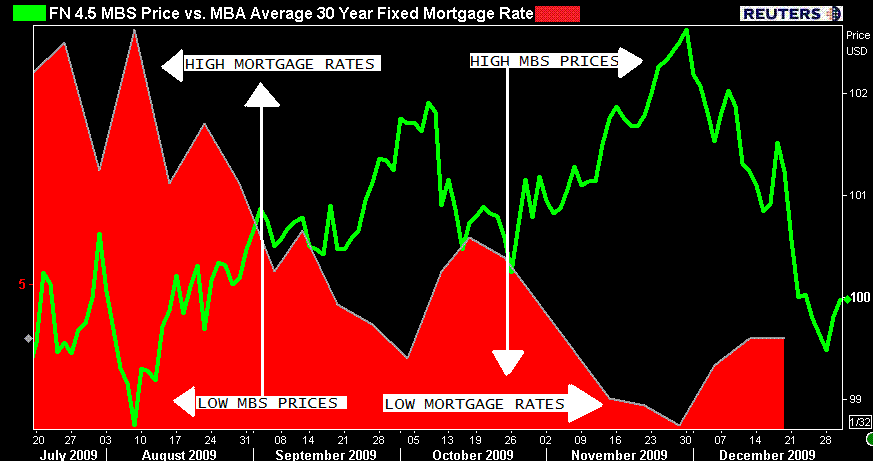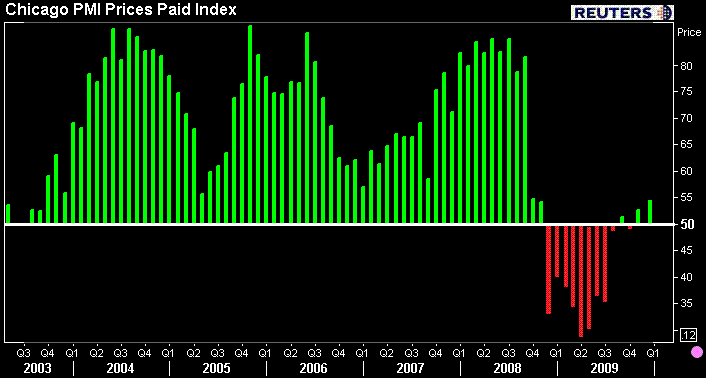The six day streak of rising mortgage rates finally stalled out yesterday!
Although mortgages started the session on a negative note, mortgage-backed securities prices managed to recovery all early losses following a slightly above average 5 year Treasury note auction. After the auction, several lenders repriced for the better which moved mortgage rates a few basis points lower.
Remember, when MBS prices fall, mortgage rates rise. I think this chart will help visualize the relationship between MBS prices and mortgage rates. When MBS prices are high, mortgage rates are low. When MBS prices are low, mortgage rates are high.

The economic calendar is mostly empty on this last full trading day of 2009. The normally scheduled weekly release of the Mortgage Bankers Association's Loan Application Index was not published today because the MBA offices are closed for the holidays. Don't panic though, the January 5th release will include data from the previous 2 weeks.
The only noteworthy release was the Chicago PMI at 9:45am. This report is a survey of business conditions in the Chicagoland area, conducted by The Institute of Supply Management each month. Readings above 50 indicate expanding economic conditions while readings below 50 indicate economic contraction. This survey has been steadily improving with the past three reports indicating improving conditions in the Chicago manufacturing sector. Last month’s survey came in at 56.1, the highest reading in over a year. The trend of improvement continued in December with today’s report beating beating expectations with a reading of 60.0 which is the highest reading since January 2006. All components of the index were better except Supplier Deliveries. The most influential observations:
1. The EMPLOYMENT index improved into expansionary territory (remember over 50 = sector expanding) for the first time since November 2007.
2. The PRICES PAID index ventured farther into EXPANSION territory.
Observation #1 implies continued economic stabilization. Unless the labor market improves, it will be difficult for the housing market to recovery (borrowers can't qualify without a job!). Housing needs the labor market to recovery ASAP!
Observation #2 is a bit more troubling. Check out the chart below. This month's PRICE PAID index ticking over 50 implies prices are moving higher!
Although only in its early stages, we do not want producer costs growing. If businesses have to pay more for the materials they use to produce their widgets …they are mostly likely going to pass along those additional costs to you…the consumer.
50 is middle ground for this survey. Above 50=Growth. Below 50 = Contraction.

The point of me sharing this chart with you was to call attention to early signs of INFLATION. Although inflation at the producer level does not always lead to higher prices paid by consumers, especially when consumer demand is low, the bond trader community will take note of this uptick in PRICES PAID. If more and more signs of inflation begin to show in data...MORTGAGE RATES WILL RISE.
At 1pm, the Treasury will release the results of its final debt auction of 2009. Today they will offer $32 billion 7 year notes. Despite record amount of U.S. government borrowing, demand for our nation’s debt has continued to remain strong which is one of many factors that have contributed to the near record low mortgage rates which we have enjoyed for over a year. If the demand at today’s auction is weak, it could pressure the fixed income market down in price which might lead to higher mortgage rates. The auction results will be covered on the MBS Commentary blog.
Reports from fellow mortgage professionals do indicate lender rate sheets have improved from yesterday. The par 30 year conventional rate mortgage is in the 4.875% to 5.25% range for well qualified consumers with reports of at least one lender offering 4.875%. To secure a par interest rate you must have a FICO credit score of 740 or higher, a loan to value at 80% or less and pay all closing costs including an estimated one point loan origination/discount/broker fee.




